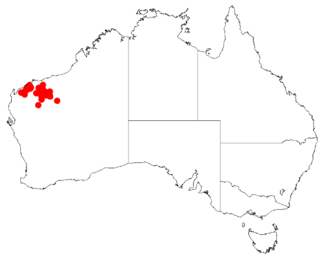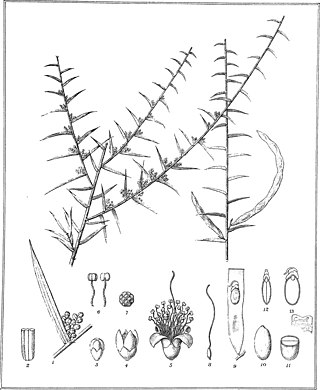
Acacia arcuatilis is a shrub belonging to the genus Acacia and the subgenus Juliflorae that is endemic to south western parts of Australia.

Acacia atkinsiana, commonly known as Atkin's wattle, is a shrub belonging to the genus Acacia and the subgenus Juliflorae endemic to Australia. The indigenous peoples of the area where the shrub is found, the Kurrama peoples, know the shrub as Bilari or Pilarri.

Acacia filifolia is a shrub belonging to the genus Acacia and the subgenus Juliflorae that is endemic to western Australia.

Acacia limbata is a shrub belonging to the genus Acacia and the subgenus Juliflorae that is endemic across northern Australia.

Acacia multispicata, commonly known as spiked wattle, is a shrub belonging to the genus Acacia and the subgenus Juliflorae that is endemic to south western Australia.

Acacia orthocarpa, also commonly known as Pilbara weeping wattle, needle-leaf wattle or straight-podded wattle, is a shrub or tree belonging to the genus Acacia and the subgenus Juliflorae that is endemic to tropical parts of northern Australia. The indigenous Nyangumarta peoples know it as yartupu.
Acacia paula is a shrub belonging to the genus Acacia and the subgenus Juliflorae that is endemic to a small area of north western Australia.

Acacia rhodophloia, commonly known as minni ritchi or western red mulga, is a tree or shrub belonging to the genus Acacia and the subgenus Juliflorae that is endemic to a large area of arid central western Australia. The Indigenous group the Kurrama peoples know the plant as mantaru.

Acacia trachycarpa, commonly known as minni ritchi, curly-bark tree, sweet-scented minni ritchi or Pilbara minni ritchi, is a shrub or tree belonging to the genus Acacia and the subgenus Juliflorae that is native to arid and semi-arid areas of Western Australia.

Acacia wickhamii is a shrub belonging to the genus Acacia and the subgenus Juliflorae that is endemic to parts of northern Australia.

Acacia yorkrakinensis, also known as soft-leaf wodjil, is a shrub belonging to the genus Acacia and the subgenus Juliflorae that is native to Western Australia.

Acacia gonophylla, also known as rasp-stemmed wattle, is a shrub belonging to the genus Acacia and the subgenus Phyllodineae that is endemic to south western parts of Australia.

Acacia iteaphylla, commonly known as Flinders Range wattle, Port Lincoln wattle, winter wattle and willow-leaved wattle, is a shrub belonging to the genus Acacia and the subgenus Phyllodineae that is endemic to South Australia.

Acacia urophylla, commonly known as pointed leaved acacia, tall-leaved acacia, veined wattle or net-leaved wattle, is a shrub of the genus Acacia and the subgenus Phyllodineae endemic to Western Australia.

Acacia eremaea is a shrub or tree of the genus Acacia and the subgenus Plurinerves that is endemic to an area in western Australia.

Acacia brachybotrya, commonly known as grey mulga or grey wattle, is a shrub belonging to the genus Acacia and the subgenus Phyllodineae that is endemic to Australia.

Acacia calamifolia, commonly known as wallowa or reed-leaf wattle, is a shrub or tree belonging to the genus Acacia and the subgenus Phyllodineae endemic to south eastern parts of Australia.

Acacia conferta, commonly known as crowded-leaf wattle, is a shrub belonging to the genus Acacia and the subgenus Phyllodineae that is endemic to eastern Australia.

Acacia nematophylla, commonly known as coast wallowa, is a shrub belonging to the genus Acacia and the subgenus Phyllodineae where it is endemic to southern Australia.

Acacia rhigiophylla, commonly known as dagger-leaf wattle, is a shrub belonging to the genus Acacia and the subgenus Juliflorae that is native to southern Australia.





















